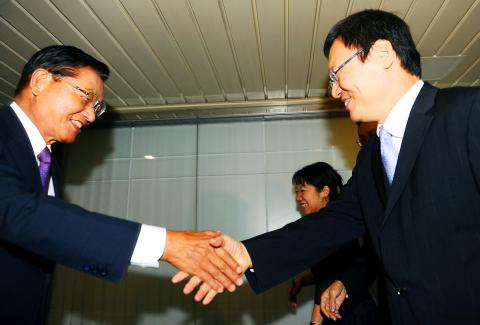Straits Exchange Foundation (SEF) Chairman Chiang Pin-kung (江丙坤) yesterday pledged to continue cross-strait negotiations under the principle of the so-called “1992 consensus” as he was re-elected to serve another three-year term.
Chiang, re-elected by the foundation’s new board of directors, promoted the government’s efforts in resuming cross-strait talks since President Ma Ying-jeou (馬英九) took office three years ago and said Taiwan and China would continue to work together and seek peace across the Taiwan Strait.
“I had called for the resumption of cross-strait negotiations and the long-term development of peaceful cross-strait relations when I first took over as chairman in 2008 and now I can proudly say we have made great achievements in cross-strait ties,” Chiang said.

Photo: Chang Chia-ming, Taipei Times
Since 2008, the foundation and China’s Association for Relations Across the Taiwan Straits have conducted seven rounds of negotiations and signed 16 agreements, including the -Economic Cooperation Framework Agreement signed last year.
Chiang yesterday said the “1992 consensus,” which refers to what the Chinese Nationalist Party (KMT) says is a mutual understanding between the two sides of the Strait that there is only one China, with each side free to interpret what that means, has improved cross-strait relations in recent years and would continue to serve as a solid foundation for future cross-strait talks.
Former National Security Council secretary-general Su Chi (蘇起), who came up with the term “1992 consensus” when he served as Mainland Affairs Council minister in 2000, was appointed as a board member yesterday, sparking speculation about his role in leading political negotiations between Taiwan and China in the future.
Su yesterday dismissed the speculation as sheer assumption, saying that he took the position to assist the foundation with related affairs as a scholar.
“It’s over-speculation … My role in the SEF is very simple, and I don’t have any special missions. I think people are over-interpreting the position,” he said.

CHANGING LANDSCAPE: Many of the part-time programs for educators were no longer needed, as many teachers obtain a graduate degree before joining the workforce, experts said Taiwanese universities this year canceled 86 programs, Ministry of Education data showed, with educators attributing the closures to the nation’s low birthrate as well as shifting trends. Fifty-three of the shuttered programs were part-time postgraduate degree programs, about 62 percent of the total, the most in the past five years, the data showed. National Taiwan Normal University (NTNU) discontinued the most part-time master’s programs, at 16: chemistry, life science, earth science, physics, fine arts, music, special education, health promotion and health education, educational psychology and counseling, education, design, Chinese as a second language, library and information sciences, mechatronics engineering, history, physical education

The High Prosecutors’ Office yesterday withdrew an appeal against the acquittal of a former bank manager 22 years after his death, marking Taiwan’s first instance of prosecutors rendering posthumous justice to a wrongfully convicted defendant. Chu Ching-en (諸慶恩) — formerly a manager at the Taipei branch of BNP Paribas — was in 1999 accused by Weng Mao-chung (翁茂鍾), then-president of Chia Her Industrial Co, of forging a request for a fixed deposit of US$10 million by I-Hwa Industrial Co, a subsidiary of Chia Her, which was used as collateral. Chu was ruled not guilty in the first trial, but was found guilty

Taiwan-based publisher Li Yanhe (李延賀) has been sentenced to three years in prison, fined 50,000 yuan (US$6,890) in personal assets and deprived political rights for one year for “inciting secession” in China, China's Taiwan Affairs Office spokesman Chen Binhua (陳斌華) said today. The Shanghai First Intermediate People’s Court announced the verdict on Feb. 17, Chen said. The trial was conducted lawfully, and in an open and fair manner, he said, adding that the verdict has since come into legal effect. The defendant reportedly admitted guilt and would appeal within the statutory appeal period, he said, adding that the defendant and his family have

DEADLOCK: As the commission is unable to forum a quorum to review license renewal applications, the channel operators are not at fault and can air past their license date The National Communications Commission (NCC) yesterday said that the Public Television Service (PTS) and 36 other television and radio broadcasters could continue airing, despite the commission’s inability to meet a quorum to review their license renewal applications. The licenses of PTS and the other channels are set to expire between this month and June. The National Communications Commission Organization Act (國家通訊傳播委員會組織法) stipulates that the commission must meet the mandated quorum of four to hold a valid meeting. The seven-member commission currently has only three commissioners. “We have informed the channel operators of the progress we have made in reviewing their license renewal applications, and